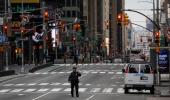About 66 per cent of the new coronavirus infection cases requiring hospitalisations in New York were people who were predominantly staying home, a trend described by the state's Governor, Andrew Cuomo as 'shocking'.

Cuomo outlined on Wednesday the results of new hospitalisation data that was collected from hospitals in a new targeted effort to further reduce the number of new hospitalisations per day.
The state received 1,269 survey responses from 113 hospitals over three days and found that the majority of individuals hospitalised were not working or travelling, predominately located in downstate New York and were predominately minorities, older individuals, non-essential employees and those that were staying at home.
"What we've done over the past few days is we asked hospitals, look at just those new cases who are coming in -- where are those people coming from and what can we learn from those people to further target and refine our strategy," Cuomo said.
He said new hospitalisation cases are disproportionately minorities, disproportionately African-American and Latino.
Cuomo said surprisingly, those getting hospitalised now for virus infection had been staying home most of the time.
"Overwhelmingly, the people were at home where there's been a lot of speculation about this a lot of people again had opinions. A lot of people have been arguing where they come from and where we should be focusing, but if you notice, 18 per cent of the people came from nursing homes. Less than 1 per cent came from jail or prison, 2 per cent came from the homeless population, 2 per cent from other congregant facilities. But 66 per cent of the people were at home. Which is shocking to us," he said.
The data also looked at whether use of public transport is leading to an increase in infection rates but the results pointed out that transportation was not adding to the infection rates.
"Transportation method, we thought maybe they were taking public transportation and we've taken special precautions on public transportation, but actually no, because these people were literally at home," Cuomo said adding that nine per cent of the new cases were driving their own vehicle and only four per cent were taking public transportation.
He said using transportation data, it was found that 84 per cent of the newly infected cased were people who had been staying at home.
"Literally. Were they working? No. They were retired or they were unemployed. Only 17 per cent working. That says they're not working, they're not travelling, they're predominantly downstate, predominantly minority, predominantly older, predominantly non-essential employees and that's important.
"We were thinking that maybe we were going to find a higher percentage of essential employees who were getting sick because they were going to work, that these may be nurses, doctors, transit workers. That's not the case and they were predominantly at home," he said.
New York State now has 323,978 confirmed virus cases and is still seeing an average of over 200 deaths daily from COVID-19.
"One of the most stubborn situations and the most distressing are the number of deaths, and that is down from where we were, but it's still 232 yesterday which is an unimaginable and painful reality that we have to deal with. And when people talk about how good things are going and the decline and the progress, that's all true. It's also true that 232 people were lost yesterday and that's 232 families that are suffering today," Cuomo said.










